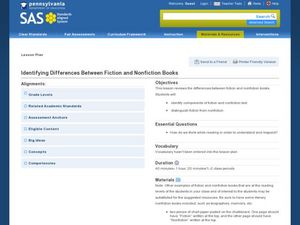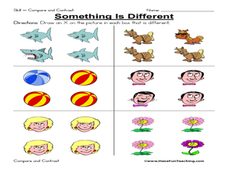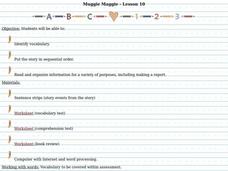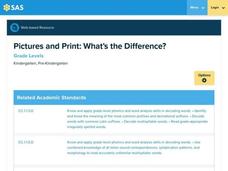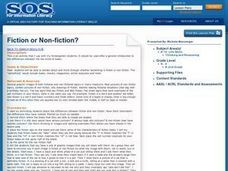Curated OER
Identifying Differences Between Fiction and Nonfiction Books
Students explore the differences between fiction and non-fiction book. For this genre study lesson, students read examples of fiction and non-fiction and identify the characteristics of each genre. Students list the characteristics on a...
Curated OER
Butterfly Life Cycle
Students read books about animals and describe their structures, how they grow and change, and their life cycles. In this animals lesson plan, students also make animals out of pasta.
Curated OER
Then What Happened?
Students complete activities about the story "Diary of a Worm", by Doreen Cronin. In this reading comprehension lesson, students make predictions and apply prior knowledge about the topic of the story. They actively listen as the book is...
Curated OER
Something is Different: Same/Different
In this different/same worksheet, student draw an X on the picture in a box that is different from the others, 6 sets total. A reference web site is given for additional activities.
Curated OER
Jack and the Beanstalk
In these reading comprehension worksheets, students complete several activities to help them learn about Jack and the Beanstalk. Students complete a cloze exercise, a reading comprehension activity, a story sequencing activity, and an...
Curated OER
Inferring Themes
Fifth graders practice making inferences on various types of reading material. As a class, they develop a definition of the word "theme" and discuss themes for some of their favorite stories. They use the context of the reading...
Curated OER
Awesome Adventures Book Report Directions
In this book report direction worksheet, students fill in the title, author, illustrator, and publisher of a book. They complete a book report based on the adventures of the main characters by answering the rest of the questions listed...
Curated OER
How Worldly Are You?
Sixth graders locate and map six components to have a working knowledge of maps. In this map skills lesson, 6th graders define the six map components and work in groups to draw a map using the components. Students read a related...
Curated OER
Narrative Literature Response Letters
Third graders write endings to a story that has already been written. They offer alternative endings in their version. The lesson includes a rubric that is to be given to the students in order that they know the requirements.
Curated OER
Hero and Heroine Activity
In this heroes and heroines worksheet, students list qualities and write a story about a heroic action of a person who has "touched their life." Students also illustrate a story moment or sequence of events.
Curated OER
Muggie Maggie
Students practice story telling by placing story elements in order to make sense to a reader. In this reading comprehension lesson, students practice using vocabulary words from the story Muggie Maggie, as well as reviewing...
Curated OER
Identify and Analyze Literary Concepts
Young scholars explore plot structure, conflict, setting, and mood. In this literary elements lesson, students read Rosa Parks, My Story and complete the provided plot outline worksheets. Young scholars discuss the text elements of...
Curated OER
A Taste of Blackberries
Fourth graders participate in a shared reading of Doris Buchanan's, A Taste of Blackberries. They read about grief in the loss of a best friend and examine the skills of a responsible family member.
Curated OER
Extremely Personal Narrative
Seventh graders practice the skill of writing a personal narrative. They bring in an object that is related to themselves. Then students discuss the importance of the items and then write a personal narrative about the objects. As an...
Curated OER
Charlie and the Chocolate Factory
Fourth graders research and write an author report on Roald Dahl, including books written by him, birthplace, family life, and other information on his writing. Students read aloud chapters in the book. Students create a newspaper...
Curated OER
Crazy Critters Creative Writing
Young scholars brainstorm animals with unusual characteristics such as a giraffe with a short neck or a zebra without stripes. They write paragraphs about their animals and work in peer editing groups to refine their stories.
Curated OER
What Was it like to Live During the Depression?
Fourth graders research a variety of sources to discover information about how the depression effect people in Michigan. They follow a research outline while working in small groups. They design a presentation that describes live during...
Curated OER
Catch Me If You Can: Over and Under
Students read a story. In this vocabulary skills lesson plan, students read The Gingerbread Man, use flannel cut outs to re-enact the gingerbread man running over and under.
Pennsylvania Department of Education
Pictures and Print: What's the Difference?
Students watch a PowerPoint presentation. In this early literacy lesson, students watch a PowerPoint presentation describing print from pictures and the difference between the two.
Curated OER
Why Thank You!
Fifth graders listen to a read aloud of Patricia Polacco's, Thank You, Mr. Falker! students examine the use of voice in the book, discuss the writing and theme ideas. They write a thank you not to their hero.
Curated OER
Voices of Tragedy and Horror: Remembering the Holocaust
Young scholars consider the implications of the Holocaust. In this World War II lesson, students read the graphic novel Maus at the end of a unit on World War II. Young scholars discuss the impact of reading about the Holocaust as well...
Curated OER
"Stone Fox" Chapter 5
In this comprehension worksheet, students answer a set of 10 multiple choice questions covering chapters 5-7 of Stone Fox. An answer key is included.
Curated OER
Fiction or Non-fiction
Third graders view three texts, A DAY IN THE LIFE OF A FOOTBALLER, THE HUMAN BODY, AND WHICH IS WHICH? with the titles covered. They discuss whether the books are non-fiction or fiction and try to come up with suitable titles for the books.
Orange County Department of Education
Integrity and a Boy Called Slow
Fifth graders identify the character trait of integrity in the main character, Slow, in "A Boy Called Slow." They participate in a discussion to determine what steps the main character took to earn his new name. Students write an essay...
